Plenary Talk (I) (Saturday, July 2nd, 2022)
Challenges and Opportunities in Autonomous Aerial Services for Megacities
US EST: 8:00 PM – 9:00 PM (The day before); US PST: 5:00 PM – 6:00 PM (The day before); London: 1:00 AM – 2:00 AM;
Berlin/Paris: 2:00 AM – 3:00 AM; Beijing: 8:00 AM – 9:00 AM; Seoul/Tokyo: 9:00 AM – 10:00 AM;
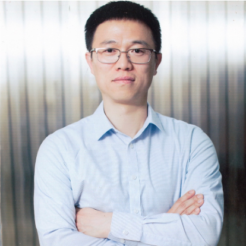
Dr. Yinian Mao
Meituan Autonomous Drone Delivery, China
Chaired by Prof. Victor Chan, Tsinghua University, China
Abstract
In the past decade, Meituan has redefined modern lifestyle services with the mission of helping people “eat better and live better!” Customers can access various kinds of services from their mobile phones, including on-demand delivery, movie ticketing, entertainment, and hotel booking etc. The services of Meituan cover over 2,800 cities and counties in China. One of the innovations in Meituan’s service delivery is autonomous delivery services. This talk introduces Meituan’s large-scale service platform and focuses on autonomous aerial delivery. In particular, challenges arising from serving tens of millions customers in highly-populated city environment will be discussed. Opportunities for better and/or new services will be highlighted.
Bio
Dr. Yinian Mao leads Meituan’s Autonomous Drone Delivery Business Unit. Meituan is the largest internet platform for everyday services in China, and Autonomous Drone Delivery Business Unit’s mission is to serve millions of users every day using autonomous aerial robots. From 2015 to 2018, Dr. Mao was founder and CEO of Airlango Technology, specializing in aerial robot perception and intelligence. Before founding Airlango, Dr. Mao was Senior Staff Engineer with Qualcomm Research, San Diego. He received his Ph.D. degree in Electrical Engineering from University of Maryland in 2006, and B.S.E. degree in Electronic Engineering from Tsinghua University, Beijing, China in 2001. He was a co-author of more than twenty peer-reviewed papers, and inventor for more than 30 patents worldwide.
Plenary Talk (II) (Saturday, July 2nd, 2022)
How Changing Affordances Affect the Development and Monetization of Digital Services
US EST: 8:00 AM – 8:50 AM; US PST: 5:00 AM – 5:50 AM; London: 1:00 PM – 1:50 PM;
Berlin/Paris: 2:00 PM – 2:50 PM; Beijing: 8:00 PM – 8:50 PM; Seoul/Tokyo: 9:00 PM – 9:50 PM;

Prof. Christian Matt
Professor, University of Bern, Switzerland
Chaired by Prof. Robin Qiu, Pennsylvania State University, USA
Abstract
Digital technologies enable new and advanced forms of user behavior and interactions. The potentials for actions that arise from the relationship between technologies and goal-oriented users can be subsumed as “affordances”. While research has already embraced the affordance concept, practical insights into its implementation are still in infant stages. Assuming an affordance perspective during service design could allow firms to better account for the user perspective and to optimize the monetary potential of their digital services offers. We discuss practical implications as well as arising opportunities for research on digital services that result from the integration of the affordance lens.
Bio
Christian Matt is a Professor and Co-director of the Institute of Information Systems at the University of Bern, Switzerland. He holds a Ph.D. in Management from Ludwig-Maximilians-Universität (LMU), Munich, Germany. His current research focuses on digital transformation and value creation, hybrid intelligence, and data-based services. His research has been published in the Journal of Management Information Systems, Information Systems Journal, European Journal of Information Systems, MIS Quarterly Executive, and several others.
Plenary Talk (III) (Sunday, July 3rd, 2022)
Roles of Data Analytics and Operations Research in Creating an Adaptable City
US EST: 8:00 PM – 8:50 PM (The day before); US PST: 5:00 PM – 5:50 PM (The day before); London: 1:00 AM – 1:50 AM;
Berlin/Paris: 2:00 AM – 2:50 AM; Beijing: 8:00 AM – 8:50 AM; Seoul/Tokyo: 9:00 AM – 9:50 AM;
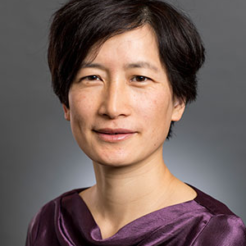
Prof. Cynthia Chen
Professor, University of Washington (Seattle), USA
Chaired by Prof. Weiwei Chen, Rutgers University, USA
Abstract
Our society relies on maximizing efficiency. But COVID-19 has revealed vulnerabilities of systems designed for maximum efficiency. In fact, COVID-19 has exhibited a kind of perturbation that was unseen before—it is an evolving process during which sometimes it gets better (so we start to relax social distancing and open schools and businesses) and then it gets worse, which forces us to close again. This has added stress to our society: what options do people, businesses and public agencies (e.g., transit) have in this evolving process of perturbation? As we anticipate that human society will face more challenges in the future, it is now time to think about creating adaptable cities that can adapt in this evolving process of perturbation. Done correctly, systems can be resource-efficient under normal times and still be able to respond to future disruptions, whether from diseases or natural disasters, more quickly. Theories and methodologies used in service science can play an important role in creating future, adaptable cities. In this talk, using an urban system of four sub-systems comprising urban space, small businesses, human behaviors, and transit as an example, I present a framework of adaptable cities and discuss how theories and methodologies in data science and analytics, operations research, and network science come together to generate the fundamental insights needed for the creation of adaptable urban systems.
Bio
Cynthia Chen is a professor in the Department of Civil & Environmental Engineering at the University of Washington (Seattle). She is an internationally renowned scholar in transportation science and directs the THINK (Transportation-Human Interaction and Network Knowledge) lab at the UW. The work at THINK lab is at the intersection of human behavior and the system within which individuals and businesses operate. More specifically, THINK lab research unpacks complexities found at different scales of an urban system from micro-level individual behaviors, to meso-scale interactions formed as the result of individual behaviors, and to macro-scale system behaviors that propagate through a single network or multiple networks. Cynthia has published over 60 peer-reviewed publications in leading journals in transportation and systems engineering including Transportation Research Part A-F and Omega, as well as interdisciplinary journals such as PNAS. Her research has been supported by federal agencies such as NSF, NIH, APAR-E, NIST, USDOT, and FHWA as well as state and regional agencies. Cynthia served a two-year assignment from 2017-19 as the Program Director of Civil Infrastructure Systems, CMMI (Civil, Mechanical, and Manufacturing Innovation) division with the National Science Foundation. She is an associate director of TOMNET (Center for Teaching Old Models New Tricks), a USDOT-funded Tier 1 University Transportation Center led by ASU. She is also an associate editor of two leading journals: Transportation Science, and Service Science and is on the editorial board of Sustainability Analytics and Modeling.
Plenary Talk (IV) (Sunday, July 3rd, 2022)
Interactive Media Empowering Digital Transformation
US EST: 8:00 AM – 8:50 AM; US PST: 5:00 AM – 5:50 AM; London: 1:00 PM – 1:50 PM;
Berlin/Paris: 2:00 PM – 2:50 PM; Beijing: 8:00 PM – 8:50 PM; Seoul/Tokyo: 9:00 PM – 9:50 PM;
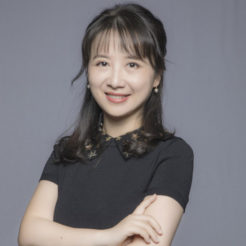
Ms. Sammi Xia
VP of Tencent Games, Head of Tencent Institute of Games, China
Chaired by Prof. Victor Chan, Tsinghua University, China
Abstract
TBA
Bio
Sammi Xia joined Tencent in 2002 as one of the founding members of Internet Value Added Service, and subsequently served as General Manager and VP for Morefun Studio Group, where she led the development and publication of multiple successful games. Sammi Xia assumed the role of Dean for Tencent Institute of Games in 2016. She currently shoulders the responsibility of building IUR Collaboration, creating knowledge sharing platform, incubating indie games, and stimulating developers’ communication.
Plenary Talk (V) (Monday, July 4th, 2022)
Service Analytics Facing Digital Transformation
US EST: 8:00 PM – 8:50 PM (The day before); US PST: 5:00 PM – 5:50 PM (The day before); London: 1:00 AM – 1:50 AM;
Berlin/Paris: 2:00 AM – 2:50 AM; Beijing: 8:00 AM – 8:50 AM; Seoul/Tokyo: 9:00 AM – 9:50 AM;
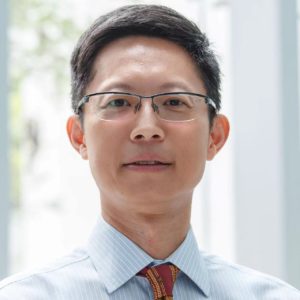
Prof. Fugee Tsung
Professor, Hong Kong University of Science and Technology (HKUST), China
Chaired by Prof. Victor Chan, Tsinghua University, China
Abstract
This talk will present and discuss the challenges and opportunities that service analytics face in the era of digital transformation and the roles we play to drive such change. In particular, under the digital transformation paradigm, there is ample opportunity for service and industrial analytics to explore different ways of creating value for both providers and customers from data and big data. On research: I will update the recent progress in our Quality and Data Analytics Lab on change detection in a system with heterogeneous data streams. On education: I will share the recent development of HKUST 2.0: a cross-disciplinary paradigm.
Bio
Prof. Fugee Tsung is Chair Professor and Acting Dean of the Information Hub, Guangzhou Campus, at the Hong Kong University of Science and Technology (HKUST). He is also the Director of the Quality and Data Analytics Lab and former Editor-in-Chief of the Journal of Quality Technology (JQT). He has been elected Academician of the International Academy for Quality (IAQ), Fellow of the American Statistical Association (ASA), the Institute of Industrial and Systems Engineers (IISE), the American Society for Quality (ASQ), and the Hong Kong Institution of Engineers (HKIE). He received his Ph.D. and MSc in industrial and operations engineering from the University of Michigan, Ann Arbor. He authored over 150 refereed journal publications and received IISE Transactions‘ Best Paper Award three times, in 2004, 2009, and 2018, respectively. His research interests include industrial big data and quality analytics.
Plenary Talk (VI) (Monday, July 4th, 2022)
Service 4.0 and Intelligent Services
US EST: 8:00 AM – 8:50 AM; US PST: 5:00 AM – 5:50 AM; London: 1:00 PM – 1:50 PM;
Berlin/Paris: 2:00 PM – 2:50 PM; Beijing: 8:00 PM – 8:50 PM; Seoul/Tokyo: 9:00 PM – 9:50 PM;
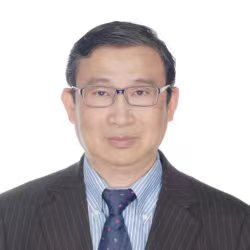
Dr. Zhibin Jiang
Professor, Shanghai Jiao Tong University, China
Chaired by Prof. Robin Qiu, Pennsylvania State University, USA
Abstract
In recent years, the development and application of emerging technologies such as Internet of Things, big data, cloud computing, artificial intelligence, 5G, and blockchain have promoted the traditional service industry towards informatization and intelligence, but have also brought new challenges to the innovation and management of service systems. This talk first introduces the background of Service 4.0, proposes that its core is the deep integration of human-machine-things, and analyzes its fundamental changes compared with the three stages of Service 1.0, 2.0 and 3.0. Next, the connotation and key characteristics of intelligent service are analyzed and the four-dimensional expression model of intelligent service system is constructed. Then, this talk put forward the opportunities and challenges faced by the construction of intelligent service system in the Service 4.0 era. Finally, the application prospects and some future research topics of Service 4.0 and intelligent service are introduced.
Bio
Dr. Zhibin Jiang is Dean of Institute of Industrial & System Engineering and Distinguished Professor of Antai College of Economics and Management, Shanghai Jiao Tong University. He obtained his Ph. D. degree in Manufacturing Engineering & Engineering Management from City University of Hong Kong in 1999. He is Changjiang Scholar Program Chair Professor of MOE China and Fellow of Institute of Industrial & System Engineers (IISE). He is Vice President of Chinese Industrial Engineering Society, Vice President of the Advisory Committee of IE Undergraduate Programs of Ministry Of Education, China, and Regional VP of IISE for Asia. He has finished or is undertaking 3 NSFC funded key projects, 8 NSFC funded projects, and over 20 other China national projects. He has also published about 300 papers and authored 5 books.